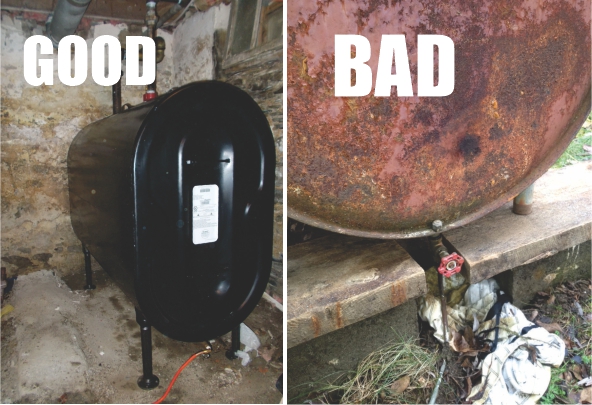NY State recommends homeowners inspect fuel storage annually.
Safety Considerations For Oil Tanks
When heating with oil, safe delivery and storage of that fuel is critical. Preventing spills and working with every customer to support that goal is something we have prioritized for a long time. For example, we require a tank inspection be performed prior to making the first delivery to a new customer. Now the State of New York Department of Environmental Conservation (DEC) recommends homeowners who heat with oil inspect their own equipment annually to help prevent future spills.
According to the DEC, “some of the most common causes of home fuel oil spills are: failing storage tanks; faulty fuel lines and connections; collapsing tank legs and supports; and overflows during deliver.” (DEC Press Release, Oct. 3, 2018). Inspecting your equipment is an excellent first step, and if you know what to look for it isn’t hard at all.
Here is a checklist to get you started.
Fuel Tank
- Is your fuel tank secure and level? Is your fuel tank installed on a concrete floor, a concrete pad, or on 4″ solid concrete blocks using iron pipe tank legs with floor flanges so that the tank is properly supported? The fuel storage tank should not be installed on fieldstone or wood.
- Is the fuel tank free of seeps, pits, dents, or RUST? (Be sure to shine a light on the bottom of the tank, where pitting is most likely to occur. Tanks rust from the inside-out and those older than 15 years are more likely to have rust damage.)
- Does your fuel tank have a firematic valve and fuel filter? In the event of a fire, the valve will automatically shut, ensuring the fuel tank will not feed oil to a building fire.
- Does your fuel tank have a tank gauge so you can monitor the level of fuel in your tank? Make sure it isn’t cracked or frozen.
- Does your fuel tank have an overfill whistle that can be heard by the person delivering the fuel?
Fills and Vents
- Is your fill pipe a 2″ iron pipe and your vent pipe at least 1-1/2″ iron pipe? If you have plastic fill pipes, please notify us immediately.
- Is the area near the fill or vent pipe free of stains, sheen or strong fuel odors?
- Does your vent pipe have a vent alarm that will signal our delivery person when the storage tank is full? Faulty or non-existent fill alarms can lead to overfills and spills.
- Be sure the vent pipe is clear of snow or other obstructions.
Fuel Lines, Filters and Valves
- Is your fuel line protected with a vinyl coating or sleeved with a PVC pipe or a protective sheath?
- Is the area around the fuel filter or other valves free of drips or signs of leaks?
Please reach out to us right away if you answered “NO” to any of the above questions!
Even if you answer “MAYBE” or “DON’T KNOW” – if you have concerns, we should check them out, so please contact us. We can send someone out free of charge to inspect your equipment and help determine what should or could be done to address the concern. If you are worried about persons coming into your home at this time, or if you are under quarantine orders, we can consult over ZOOM or another interface to provide peace of mind and recommendations.

